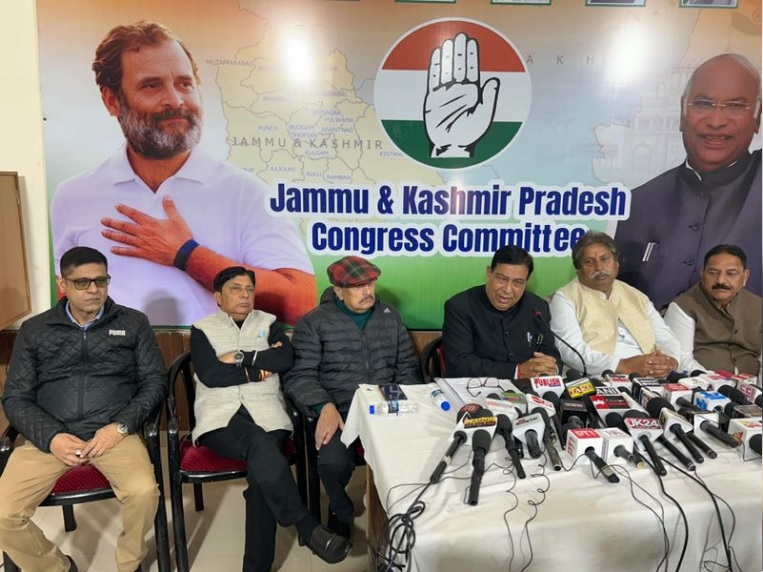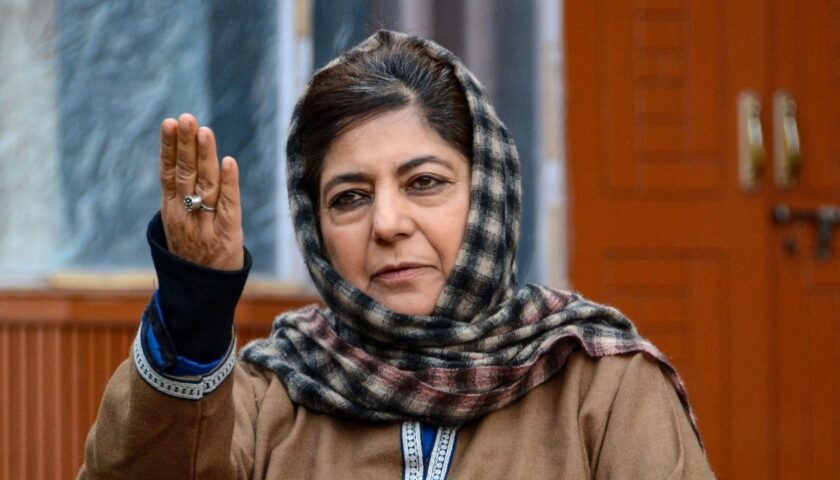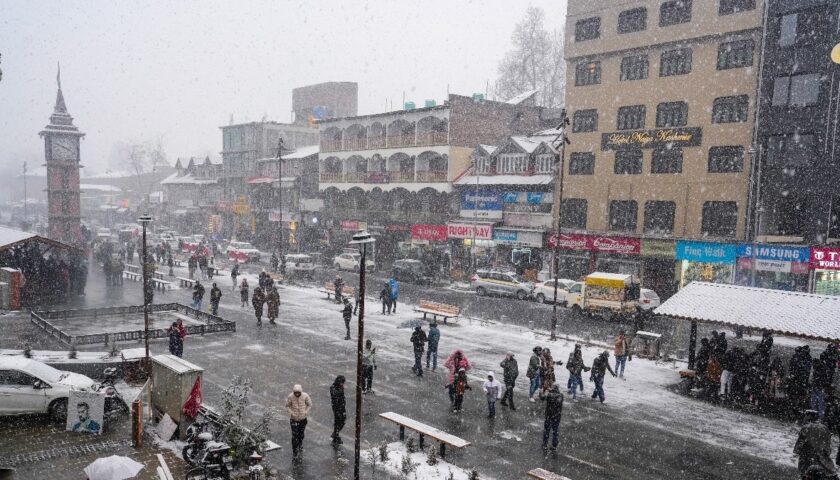Congress Accuses BJP of Communalizing Vaishno Devi Medical College Row to Hide Governance Failures
By: Javid Amin | 27 November 2025
A Medical College Admission List Sparks a Political Firestorm
A routine NEET-based merit list at the newly established Shri Mata Vaishno Devi Institute of Medical Excellence (SMVDIME) has escalated into one of the most politically charged controversies in Jammu & Kashmir this year. Out of 50 MBBS seats, 42 were secured by Muslim students, triggering protests by the Bharatiya Janata Party (BJP) and allied right-wing groups, who demanded a “Hindu-only quota” citing shrine-funded infrastructure.
However, the narrative sharply shifted this week when the Jammu & Kashmir Congress leadership launched a fierce counterattack, accusing BJP of deliberately communalizing the issue to hide its failures in governance, legal oversight, and educational planning.
The clash has opened ideological fronts on meritocracy, secularism, community rights, political accountability, and the ethics of running professional institutions backed by religious trusts.
Congress Strikes Back: “BJP is Dividing Communities to Hide its Blunders”
In a strongly worded press conference, senior Congress leaders Raman Bhalla and Ravinder Sharma accused BJP of weaponizing religious sentiments after its own “policy missteps” led to the SMVDIME uproar.
1. BJP Accused of “Failing to Protect Hindu Interests” During Approval
Congress leaders argued that it was BJP-led governments — both at the Centre and in the Union Territory — that approved the medical college without putting in place any special guidelines or protective provisions they now claim to champion.
“If there was any lapse in safeguarding Hindu community interests, then BJP is solely responsible,”
Congress leaders asserted.
They argued that BJP’s sudden outrage is political theatre, masking the fact that all recognition, permissions, and NEET compliance procedures were issued during BJP’s own tenure.
2. J.P. Nadda Under Direct Fire
Congress squarely blamed Jagat Prakash Nadda, who simultaneously served as the Union Health Minister and BJP national president during key phases of SMVDIME’s formation.
The party alleged:
-
Nadda’s ministry oversaw NEET regulations.
-
His approval committees recognized SMVDIME as a general (non-minority) institution.
-
He failed to incorporate any religious or community-linked admission safeguards, despite knowing the shrine-based identity of the institution.
Thus, Congress argues, BJP’s top leadership enabled the very system they are now protesting against.
3. Shrine Board Also Criticized
Congress also found fault with the Shri Mata Vaishno Devi Shrine Board (SMVDSB), which manages the college.
They asserted that the Board:
-
Never demanded religious preference norms during the approval process
-
Knew that NEET rules prohibit faith-based filters
-
Failed to anticipate political or societal sensitivities in Jammu’s Hindu-majority belt
However, Congress clarified that the core issue is not the Board, but the BJP-led administration’s attempt to twist the situation after its own procedural failures.
Congress’ Central Claim: “BJP Is Fueling Communal Tension to Distract the Public”
Congress insisted that BJP’s move to demand Hindu-only quota is neither organic nor principled — but a scripted distraction.
The party accuses BJP of:
1. Communalizing Education to Hide Governance Lapses
Congress argues:
-
BJP approved the college setup
-
BJP approved its admission policy
-
BJP approved its NEET-based admission guidelines
-
BJP oversaw every administrative step in the UT
-
BJP held the health ministry nationally
Therefore, BJP is protesting against a problem of its own making.
2. Using Religion as a Political Weapon in Jammu
Congress said BJP has:
-
Lost its earlier dominance in Jammu’s Hindu-majority belt
-
Failed to answer questions on unemployment, price rise, local development
-
Become increasingly dependent on identity-driven politics to regain lost ground
Thus, the SMVDIME row is being intentionally turned into a Hindu-Muslim issue before upcoming election cycles.
3. Damaging Jammu’s Social Harmony
Congress warned that the BJP’s rhetoric risks:
-
Turning students into communal targets
-
Stigmatizing meritorious Muslim aspirants
-
Deepening divides between Hindu-majority Jammu and Muslim-majority Kashmir
-
Creating long-lasting resentment around educational institutions
Background: How Did a Medical Merit List Turn Into a Communal Flashpoint?
NEET-Based Admissions
SMVDIME, like all Indian medical colleges, follows:
-
NEET-UG ranking
-
No religious preference
-
No management quota in the inaugural batch
The list that triggered the controversy:
-
50 MBBS seats
-
42 Muslim students
-
8 Hindu students
Since Muslim aspirants from J&K secured high NEET scores in the region, they dominated the merit list.
BJP’s Reaction: Demand for a “Hindu Quota”
The BJP argued:
-
The college is funded by Hindu pilgrims
-
The institution must “reflect the identity of the Shrine”
-
Hindus must get priority seats
-
Muslim-majority representation is “unacceptable” in a shrine-run institute
This led to:
-
Public protests
-
Memorandums to the Lieutenant Governor
-
Sharp statements by BJP leaders
-
Backing from right-wing groups
Congress Position: Merit is Constitutional, Quota is Illegal
Congress countered:
-
NEET is national law
-
State cannot override constitutional equality
-
Shrine-backed institutions cannot discriminate
-
Religious quotas violate Articles 14 and 15
They insist that BJP’s demand is non-constitutional, non-academic, and purely political.
Deeper Political Undercurrents: Why This Issue Exploded in Jammu
1. BJP’s Shrinking Influence in Jammu
Over recent years, BJP has:
-
Lost municipal ground
-
Faced discontent over land, job, and domicile policies
-
Been accused of ignoring Jammu’s development
Communal narratives are seen by Congress as BJP’s attempt to rebuild its Hindu vote bank.
2. Congress Attempting to Reclaim “Secular Space”
By taking a strong stand for:
-
Merit-based admissions
-
Secular education
-
Constitutional equality
Congress is positioning itself as:
-
Defender of minority rights
-
Protector of educational integrity
-
Counterweight to BJP’s religious-political narrative
This helps Congress appeal to:
-
Secular Hindus
-
Educated youth
-
Civil society
-
Minority voters
3. Kashmir-Based Parties Also Watching Closely
National Conference (NC), PDP, and others have:
-
Opposed Hindu quota demands
-
Supported merit-based admissions
-
Accused BJP of polarizing Jammu
Thus, the SMVDIME row has become a triangular political battlefield:
-
BJP vs Congress
-
BJP vs regional parties
-
Jammu vs Valley narratives
Impact on Education: Why This Matters Beyond Politics
1. Risk to NEET’s National Credibility
If religious quotas are introduced at SMVDIME:
-
Other shrine or temple-backed institutions may demand similar concessions
-
Courts may intervene
-
NEET uniformity could collapse
Students nationwide could face inconsistent admission rules.
2. Threat to Secular Medical Institutions
India’s medical education system is one of the few spaces insulated from political and sectarian influence.
Congress warns that BJP’s demands risk:
-
Setting unconstitutional precedents
-
Creating faith-based medical colleges
-
Eroding the scientific, secular ethos of healthcare
3. Fear Among Meritorious Students
The polarization may:
-
Discourage Muslim students from applying
-
Create psychological fear
-
Lead to communal targeting
-
Damage the institution’s reputation before its first batch is even admitted
Shrine Board in the Crossfire: Governing Faith, Public Funds & Education
Though SMVDIME is built using shrine resources, it also:
-
Uses government backing
-
Follows national medical council guidelines
-
Must comply with NEET rules
Congress argues:
“If BJP believed shrine institutions should have religious quotas, why did they approve a secular framework from day one?”
The Shrine Board is now under pressure from both sides:
-
BJP wants religious preference
-
Congress demands accountability
-
Civil society demands transparency
What This Means for Jammu & Kashmir’s Political Landscape
1. Increasing Polarization
The controversy has fueled:
-
Hindu-Muslim narratives
-
Jammu vs Kashmir debates
-
Party vs party confrontations
2. Congress Strengthening Its Opposition Role
By attacking BJP’s governance, Congress is:
-
Reinforcing itself as an alternative in Jammu
-
Regaining attention in the UT
-
Aligning with regional demands for secular governance
3. BJP Facing Unusual Backlash in Its Stronghold
For the first time in years, BJP is:
-
On the defensive in Jammu
-
Accused by opponents of abandoning Hindu sentiments
-
Criticized for administrative inconsistency
Bottom-Line: A Test of India’s Constitutional Values
The SMVDIME controversy goes far beyond a medical merit list.
It is a test of:
-
Whether India will uphold meritocracy over communal politics
-
Whether shrine-linked institutions can remain secular and professional
-
Whether political parties will use religion as a tool or respect educational integrity
-
Whether the people of Jammu & Kashmir can avoid falling into deeper communal trenches
Congress’ attack has reframed the debate:
From “Hindu vs Muslim admissions” → to “BJP’s governance failures and diversion tactics.”
As the issue unfolds, J&K — and India — must choose between two models:
-
Faith-based politics controlling education, or
-
Constitution-based governance protecting equal opportunity.
The choice will define the future of not only SMVDIME, but the very soul of India’s educational system.




